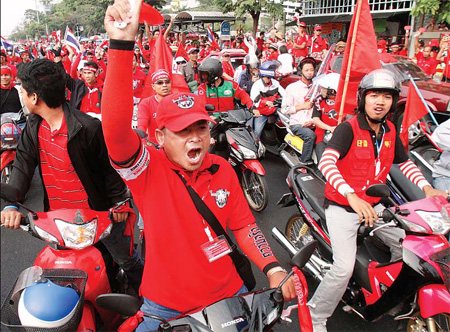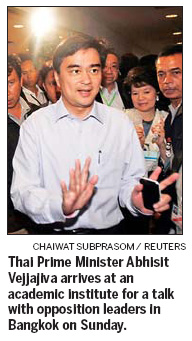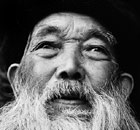Asia-Pacific
Thai PM meets foes on live television encounter
(China Daily)
Updated: 2010-03-29 08:12
 |
Large Medium Small |
Abhisit agrees to face-to-face talk but Red Shirts get no concessions
BANGKOK - Thai Prime Minister Abhisit Vejjajiva held direct talks on Sunday with leaders of anti-government protests to defuse deepening tensions, agreeing to their demand that the meeting be broadcast live on national television.
 Supporters of former Prime Minister Thaksin Shinawatra rally outside a Thai army base in Bangkok on Sunday. [Agencies] |
After weeks of demonstrations and fiery rhetoric that prompted Abhisit to seek refuge at an army base, the two sides sat across a conference table from each other and shook hands. They then reiterated their sharply different stances.
| ||||
A tense-looking Abhisit - accompanied by two advisers, all wearing blue shirts - reiterated his position that dissolving Parliament immediately would not solve Thailand's deep political crisis.
"I have to make a decision based on a consensus from the entire country, including the Red Shirts," Abhisit said.
Abhisit has repeatedly rejected the protesters' demands that he dissolve Parliament and call new elections.
Thousands of protesters gathered in the historic heart of Bangkok awaiting direction from their leaders on how to respond if the talks failed. During more than two weeks of protests, the number of participants has peaked at more than 100,000.
The protest movement consists largely of supporters of former Prime Minister Thaksin Shinawatra, who was ousted by a 2006 military coup for alleged corruption, and pro-democracy activists who opposed the army takeover.

Protest leaders have increasingly portrayed the demonstrations as a struggle between Thailand's impoverished, mainly rural masses and a Bangkok-based elite impervious to their plight.
The Red Shirts believe that Abhisit came to power illegitimately with the connivance of the military and other parts of the traditional ruling class and that only new elections can restore integrity to Thai democracy.
In recent days, the protests have turned increasingly confrontational and raised fears of violence.
The protesters issued an ultimatum on Sunday threatening to scale the walls of the army base where Abhisit has been staying unless he agreed to meet them face-to-face.
Abhisit went on national television earlier in the day saying he would not bow to ultimatums. Two hours later, however, he agreed to the talks to "find a way to restore peace and minimize the chance of violence".
The two sides met at an academic institute on the outskirts of Bangkok. Security officers searched the venue for bombs before Abhisit entered.
Four Thai soldiers were wounded early Sunday when two grenades were fired into the army barracks at the 11th Infantry Regiment that is serving as Abhisit's base, Thai media reported.
More than a dozen explosions have hit government targets since the protests began, including attacks on two television stations and the customs department on Saturday that wounded at least eight, according to the Thai News Agency.
Abhisit has called in thousands of troops to guard Parliament, government buildings and other key locations. Protesters have denounced the show of military force as unfitting for a democracy.
The Red Shirts held a full-day rally Saturday that drew more than 60,000 supporters and took a more confrontational stance than previous gatherings.
The protesters forced soldiers to retreat from parts of Bangkok's historic district, where the rallies have been concentrated.
Associated Press










